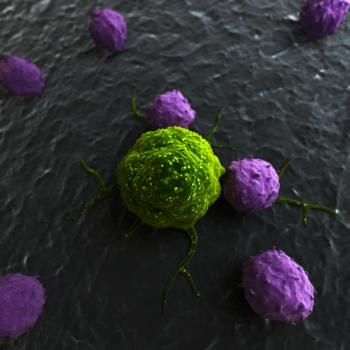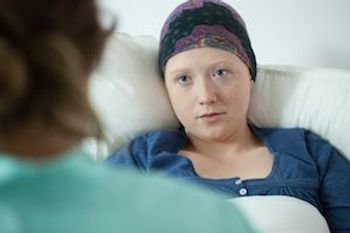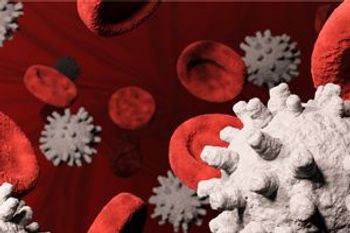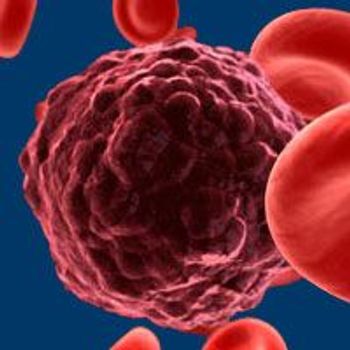Surabhi Dangi-Garimella, PhD
Articles by Surabhi Dangi-Garimella, PhD

A median 19-month follow-up of the JULIET trial—a single-arm, open-label, multicenter, global, pivotal phase 2 trial of the chimeric antigen receptor-T cell therapy tisagenlecleucel directed against CD19-expressing B cells—has found a 40% complete response and a manageable safety profile in adult patients with relapsed/refractory (R/R) diffuse large B-cell lymphoma (DLBCL).

Health resource utilization data gathered from the TRANSCEND-NHL trial have found that longer stays in the intensive care unit have a significant impact on the cost of care due to cytokine release syndrome (CRS) following treatment with chimeric antigen receptor (CAR) T cells.

A multicenter retrospective study that evaluated the efficacy and safety of chimeric antigen receptor (CAR) T-cell treatment, axicabtagene ciloleucel (axi-cel; Yescarta), in a real-world setting found a similar response as well as toxicity compared with the ZUMA-1 clinical trial.

The trial is designed to test chimeric antigen receptor (CAR) T-cell therapy in children and young adults with relapsed/refractory brain and central nervous system (CNS) tumors, wherein the modified CAR T cells will be directly injected at the site of tumor resection or into the ventricular system of the CNS.

At the 2018 American Society of Clinical Oncology Annual Meeting, June 1-5, Chicago, Illinois, Noopur S. Raje, MD, director, Center for Multiple Myeloma, Massachusetts General Hospital Cancer Center, presented results from the phase 1 multicenter study with a second-generation chimeric antigen receptor (CAR) T-cell therapy called bb2121.

Reimbursement models, novel gene therapy–based treatments, and price transparency: these were some of the topics covered by presenters and panelists at the annual meeting of the Community Oncology Alliance.

How are community practices coping with administering chimeric antigen receptor (CAR)-T treatments? At the 2018 Community Oncology Conference hosted by the Community Oncology Alliance, Houston Holmes, MD, MBA, FACP, Texas Oncology, shared his experience with administering CAR T-cells in a community cancer center–based setting.

Coverage from the 59th Annual Meeting and Exposition of the American Society of Hematology, December 9-12, 2017.

A much-anticipated session on the second day of the 59th Annual Meeting and Exposition of the American Society of Hematology provided long-term updates on trials evaluating 2 chimeric antigen receptor-T (CAR T) treatments: tisagenlecleucel or CTL019 (Kymriah) for the treatment of adult relapsed/refractory diffuse large B-cell lymphoma (DLBCL) and axicabtagene ciloleucel (Yescarta) evaluated in patients with refractory aggressive non-Hodgkin lymphoma.

An early-stage trial in pediatric and young adult patients with relapsed/refractory B-cell acute lymphoblastic leukemia (B-ALL) has found that modifying the chimeric antigen receptor (CAR) T cells to target the CD22 receptor achieved remission.

Axicabtagene ciloleucel (Yescarta) has been approved to treat adult patients with diffuse large B-cell lymphoma who have not responded to or who have relapsed after at least 2 other kinds of treatment.

Evidence-Based OncologyTM sat down with Brandon R. Shank, PharmD, MPH, BCOP, clinical pharmacy specialist, Division of Pharmacy, The University of Texas MD Anderson Cancer Center, to understand a pharmacist's role in administering chimeric antigen receptor (CAR) T cells.

Physicians across different institutes who have been involved in clinical trials of chimeric antigen receptor (CAR) T cells in B-cell lymphomas have developed a guideline for monitoring and managing the symptoms associated with this treatment.

Cellectis, a clinical-stage biotechnology company, was asked by the FDA to place a clinical hold on 2 phase 1 trials evaluating its allogeneic chimeric antigen receptor-T (CAR-T) cell treatments following the report of a fatality in the first patient treated in one of the studies.

A look at some of the major developments in the chimeric antigen receptor T (CAR-T) cell space.

Chimeric antigen receptor (CAR)-T cells can re-expand in a lymphoma patient months after the initial infusion and can also be active against the patient’s cancer, according to a new study.

The Institute for Clinical and Economic Review (ICER) has released a draft version of their scoping document that will compare the clinical effectiveness and value of 2 chimeric antigen receptor (CAR)-T cell treatments being reviewed by the FDA.

There’s a lot happening in clinical practice with immunotherapy treatments: expanded indications for nivolumab and ipilimumab, biomarkers to judge patient response to combinations, and developments with CAR-T.

CTL019 was unanimously approved by FDA’s Oncologic Drugs Advisory Committee (ODAC) for the treatment of children and young adults with relapsed or refractory B-cell acute lymphoblastic leukemia.

Based on the results of the phase 2 ZUMA-1 trial in patients with refractory non-Hodgkin lymphoma, Kite Pharma has submitted for, and received, a priority review for its chimeric antigen receptor (CAR)-T cell treatment, axicabtagene ciloleucel.

How will drug developers price gene therapy treatments to recover their investment and ensure that society can bear the impending cost?

The company did not recover from the 5 patient deaths associated with JCAR015 in 2016.

David L. Porter, MD, kicked off the 5th annual Patient-Centered Oncology Care® (PCOC®) meeting in Baltimore on November 17, 2016, with an update on chimeric antigen receptor T-cell therapy.

An oncologist provides insight on his experience with using CAR-T therapy in the clinic and his prediction for the future of this revolutionary treatment.

Treatment with concurrent ibrutinib improves expansion of chimeric antigen receptor T-cells and could subsequently improve response in patients with chronic lymphocytic leukemia, according to a study presented during the 2017 ASH Annual Meeting.

A study presented at the 2016 ASH Annual Meeting identified potential biomarkers of response to anti-CD19 CAR T-cell treatment in patients diagnosed with chronic lymphocytic leukemia.

“Off-the-shelf” chimeric antigen receptor (CAR)-T cells, also known as universal donor cells, were used in 2 young infants with relapsed, refractory acute lymphoblastic leukemia resulted in molecular remission in 28 days in both infants.

The improved expansion of chimeric antigen receptor (CAR) T-cells indicates a deeper clinical response.

At the 58th American Society of Hematology Annual Meeting & Exposition, Jan Joseph Melenhorst, PhD, presented results of a study evaluating biomarkers of response to anti-CD19 CAR T-cell treatment in patients diagnosed with chronic lymphocytic leukemia (CLL).

In high-risk patients with chronic lymphocytic leukemia (CLL), CD19 chimeric antigen receptor (CAR)-T cells of defined composition can be administered with an acceptable early toxicity.







